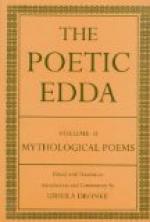Gripisspa (the Prophecy of Gripi), which follows, is appropriately placed first of the Volsung poems, since it gives a summary of the whole story. Sigurd rides to see his mother’s brother, Gripi, the wisest of men, to ask about his destiny, and the soothsayer prophesies his adventures and early death. This poem makes clear some original features of the legend which are obscured elsewhere, especially in the Gudrun set; Grimhild’s treachery, and Sigurd’s unintentional breach of faith to Brynhild. In the speeches of both Gripi and Sigurd, the poet shows clearly that Brynhild had the first right to Sigurd’s faith, while the seer repeatedly protests his innocence in breaking it: “Thou shalt never be blamed though thou didst betray the royal maid.... No better man shall come on earth beneath the sun than thou, Sigurd.” On the other hand, the poet gives no indication that Brynhild and the sleeping Valkyrie are the same, which is a sign of confusion. Like all poems in this form, Gripisspa is a late composition embodying earlier tradition.
The other poems are mostly episodical, though arranged so as to form a continued narrative. Gripisspa is followed by a compilation from two or more poems in different metres, generally divided into three parts in the editions: Reginsmal gives the early history of the treasure and the dragon, and Sigurd’s battle with Hunding’s sons; Fafnismal, the slaying of the dragon and the advice of the talking birds; Sigrdrifumal, the awakening of the Valkyrie. Then follows a fragment on the death of Sigurd. All the rest, except the poem generally called the Third, or Short, Sigurd Lay (which tells of the marriage with Gudrun and Sigurd’s wooing of Brynhild for Gunnar) continue the story after Sigurd’s death, taking up the death of Brynhild, Gudrun’s mourning, and the fates of the other heroes who became connected with the legend of the treasure.
In addition to the poems in the Elder Edda, an account of the story is given by Snorri in Skaldskaparmal, but it is founded almost entirely on the surviving lays. Voelsunga Saga is also a paraphrase, but more valuable, since parts of it are founded on lost poems, and it therefore, to some extent, represents independent tradition. It was, unfortunately from a literary point of view, compiled after the great saga-time was over, in the decadent fourteenth century, when material of all kinds, classical, biblical, romantic, mythological, was hastily cast into saga-form. It is not, like the Nibelungen Lied, a work of art, but it has what in this case is perhaps of greater importance, the one great virtue of fidelity. The compiler did not, like the author of the German masterpiece, boldly recast his material in the spirit of his own time; he clung closely to his originals, only trying with hesitating hand to copy the favourite literary form of the Icelander. As a saga, therefore, Voelsunga is far behind not only such great




